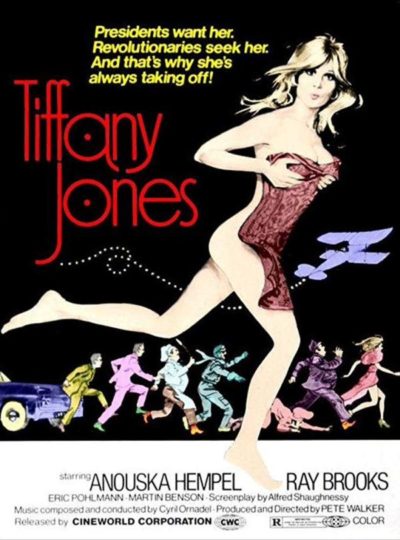★★½
“Immodesty Blaise.”
 Fashion model Tiffany Jones (Hempel) finds herself dropped into the middle of international intrigue, after President Boris Jabal (Pohlmann), leader of the Eastern European state of Zirdana, takes a shine to her during a state visit to Britain. It’s supposed to be a trade negotiation, but is really to allow Jabal to broken an arms deal with some shady Americans. Her meeting the President brings her to the attention of two factions of Zirdanian rebels.
Fashion model Tiffany Jones (Hempel) finds herself dropped into the middle of international intrigue, after President Boris Jabal (Pohlmann), leader of the Eastern European state of Zirdana, takes a shine to her during a state visit to Britain. It’s supposed to be a trade negotiation, but is really to allow Jabal to broken an arms deal with some shady Americans. Her meeting the President brings her to the attention of two factions of Zirdanian rebels.
The nice is led by Prince Salvator (Thomas), the ruler in exile. The not-so-nice are a more aggressive faction, operating out of a restaurant kitchen. Both wonder what Tiffany is doing with Jabal, and are keen to use her to achieve their ends. Which is fine by her, since she has no love for the authoritarian regime which controls Zirdana. So Tiffany agrees to a plan where Jabal will be distracted, preventing from seeing the arms dealers, and a substitute will take the meeting in his place.
Walker is better know for his S&M horror films, with titles such as House of Whipcord, and it’s safe to say saucy comedy like this is not his strong suit. There’s no shortage of sauce, to be sure. It’s reported that Hempel (now known as Lady Weinberg, through marriage) bought up the rights to the film, as well as her work with Russ Meyer, Black Snake, for showing rather too much of her. And that’s before we get to the garden party she throws for Jabal, populated by a flock of 1970’s dolly-birds, who shed their clothes enthusiastically at the drop of a cocktail napkin. The whole thing – a plot to get sexually compromising material on a visiting foreign leader – does still have contemporary resonance…
It’s the comedy angles which are a horrible failure, with virtually every attempted joke falling flatter than Hempel’s chest [quite how she ended up in a Meyer film escapes me, given his fondness for the more-endowed end of the feminine spectrum. Then again, he said later of Hempel, “We had a stand-in for the tits and wouldn’t let her speak.”] It’s not just the passage of time, for the Carry On films of the same era have endured very well: I suspect this was simply not very funny to begin with, and appears to have tanked at the box-office. Like Modesty Blaise, it was based on a British newspaper comic-strip, which ran from 1964-77. Unusually for the era, it was created by two women, Pat Tourret and Jenny Butterworth, though I suspect the newspaper version was likely less salacious.
The main redeeming aspect here is Hempel, who has a lovely, breezy charm which manages to sail above the leaden material, almost redeeming it. She portrays Jones with an endearing mix of savviness and innocence, as she dodges the (literal) grasp of President Jabal, and the more fanatical of his opponents, while working to help the Prince regain his throne. Probably wisely, the morality of replacing an absolute, unelected leader with another absolute unelected leader, simply because the latter is younger and cuter, is never addressed. Hempel is not quite enough to rescue this, and it’s perfectly understandable why this vanished into obscurity, with or without the lead actress’s help.
Dir: Pete Walker
Star: Anouska Hempel, Eric Pohlmann, Damien Thomas, Susan Sheers





 I wanted to like this more than I did: director Skiba is a veteran of the Arizona film scene, though his other film previously covered here,
I wanted to like this more than I did: director Skiba is a veteran of the Arizona film scene, though his other film previously covered here,  The kind folks at TacGirls have kindly sent over a box of their calendars. After taking care of my Christmas presents – I’m sure my mother is going to love it… – we’ve got a few left over, so would like to spread the love from here. So we’re going to give away a bunch (number vague and to be determined!). If you want one, it’s simple to put yourself in with a chance. Here’s how to enter:
The kind folks at TacGirls have kindly sent over a box of their calendars. After taking care of my Christmas presents – I’m sure my mother is going to love it… – we’ve got a few left over, so would like to spread the love from here. So we’re going to give away a bunch (number vague and to be determined!). If you want one, it’s simple to put yourself in with a chance. Here’s how to enter: This omnibus edition contains the first three volumes in Sawyer’s post-apocalyptic story: Until Morning Comes, In Too Deep, and The Way Back. The central character is 31-year-old Secret Service agent Carlie Simmons, who is on secondment to Tucson, Arizona to provide protection for the President’s daughter, Eliza Huntington, who is attending university there. Things take a sudden wrong turn, with the outbreak of a fast-spreading infection, which turns its victims into psychotic flesh-eating ghouls.
This omnibus edition contains the first three volumes in Sawyer’s post-apocalyptic story: Until Morning Comes, In Too Deep, and The Way Back. The central character is 31-year-old Secret Service agent Carlie Simmons, who is on secondment to Tucson, Arizona to provide protection for the President’s daughter, Eliza Huntington, who is attending university there. Things take a sudden wrong turn, with the outbreak of a fast-spreading infection, which turns its victims into psychotic flesh-eating ghouls. Difficult though it is to believe, a film containing the remarkable line of dialogue above still manages, largely, to be dull and uninteresting. Charlie’s Angels has a lot to answer for, spawning a slew of knock-offs and imitators as a result of its success, all over the world. In this case, the origin is Indonesia, where scientist Hardy has just discovered a new kind of super-explosive. He’s worried about it falling into the wrong hands, and rightfully so, as he and girlfriend Yanti (Octavia) are kidnapped by the evil Mr. Brutho. Yanti is able to escape, although Brutho – who goes through minions like the rest of us go through socks – plans to kidnap her mother and little sister. The aim is to use them as leverage (which is where we get the tag-line) and force Hardy to make his new explosive, for sale to a Middle Eastern potentate.
Difficult though it is to believe, a film containing the remarkable line of dialogue above still manages, largely, to be dull and uninteresting. Charlie’s Angels has a lot to answer for, spawning a slew of knock-offs and imitators as a result of its success, all over the world. In this case, the origin is Indonesia, where scientist Hardy has just discovered a new kind of super-explosive. He’s worried about it falling into the wrong hands, and rightfully so, as he and girlfriend Yanti (Octavia) are kidnapped by the evil Mr. Brutho. Yanti is able to escape, although Brutho – who goes through minions like the rest of us go through socks – plans to kidnap her mother and little sister. The aim is to use them as leverage (which is where we get the tag-line) and force Hardy to make his new explosive, for sale to a Middle Eastern potentate. Kozue (Yokoyama) and her younger sister Akane (Momomiya) are driving through the countryside when their car breaks down, near a closed camp-ground. Closed – but, unfortunately for them, not deserted. The well-mannered young man whom they first encounter turns out to be a lure, who brings the two women into the grasp of a pack of psychopaths. The nicknames these weirdos have, largely sum up the extreme peril of the situation for the siblings: Hypo, Pyro, Copro, Necro and Thanatos. It turns out they were all pals during an enforced stay in a nearby mental hospital. When that shut down suddenly (in a way explained later on), they opted to hang around, forming some kind of sexually-deviant collective. Kozue and Akane pretty much represent a theme-park for these perverts.
Kozue (Yokoyama) and her younger sister Akane (Momomiya) are driving through the countryside when their car breaks down, near a closed camp-ground. Closed – but, unfortunately for them, not deserted. The well-mannered young man whom they first encounter turns out to be a lure, who brings the two women into the grasp of a pack of psychopaths. The nicknames these weirdos have, largely sum up the extreme peril of the situation for the siblings: Hypo, Pyro, Copro, Necro and Thanatos. It turns out they were all pals during an enforced stay in a nearby mental hospital. When that shut down suddenly (in a way explained later on), they opted to hang around, forming some kind of sexually-deviant collective. Kozue and Akane pretty much represent a theme-park for these perverts. Lauren Pierce (Noble) is an expert archer, leading her high-school team. However, after she rescues a friend from sexual harassment, she finds herself on the wrong side of justice, and is sent to “Paradise Trails”, an incongruously-named juvenile detention facility, where harsh discipline and indefinitely extended sentences are the order of the day. And wouldn’t you know it, the place is run by a former Olympic archer – Bob Patrice (Sage) and his creepy son, Michael (Terry). It’s not long before Lauren is plotting an unofficial departure, along with new friend Becky (Mason), who knows the truth about what’s going on behind the scenes. When they get evidence proving it during their exit, they become the hunted as Bob and Michael will go to any lengths to stop the truth from getting out.
Lauren Pierce (Noble) is an expert archer, leading her high-school team. However, after she rescues a friend from sexual harassment, she finds herself on the wrong side of justice, and is sent to “Paradise Trails”, an incongruously-named juvenile detention facility, where harsh discipline and indefinitely extended sentences are the order of the day. And wouldn’t you know it, the place is run by a former Olympic archer – Bob Patrice (Sage) and his creepy son, Michael (Terry). It’s not long before Lauren is plotting an unofficial departure, along with new friend Becky (Mason), who knows the truth about what’s going on behind the scenes. When they get evidence proving it during their exit, they become the hunted as Bob and Michael will go to any lengths to stop the truth from getting out. This dates back from 2005, before Carano was a household name in the world of mixed martial arts, or a somewhat successful actress. At this point, she was only involved in the sport of muay thai, which as it’s name suggests, is a martial art originating in Thailand. She was one of five girls training in Las Vegas under Toddy – a nickname given because the teacher’s real name of Thohsaphol Sitiwatjana was too unpronounceable to Westerners! The goal of both Toddy and his students was a trip to Thailand to take on the best local practitioners of the sport. This “documentary” covers both their training and the visit itself, climaxing with Carano’s battle against the Thai champion.
This dates back from 2005, before Carano was a household name in the world of mixed martial arts, or a somewhat successful actress. At this point, she was only involved in the sport of muay thai, which as it’s name suggests, is a martial art originating in Thailand. She was one of five girls training in Las Vegas under Toddy – a nickname given because the teacher’s real name of Thohsaphol Sitiwatjana was too unpronounceable to Westerners! The goal of both Toddy and his students was a trip to Thailand to take on the best local practitioners of the sport. This “documentary” covers both their training and the visit itself, climaxing with Carano’s battle against the Thai champion. The cinematic goodwill Carano accumulated as the result of her electric debut in
The cinematic goodwill Carano accumulated as the result of her electric debut in  I feel a little uncertain about reviewing this, since it’s basically two-thirds of a single novel. Or maybe two connected novellas. Oddly, the three entries get longer as they go, starting at 110 pages, increasing to 160 for the second and finishing off at around 210. I’ve been waiting for the third and final part to show up on special offer for a while, but it hasn’t happened. The first two parts were somewhat intriguing, just not enough to convince me to pay full price. So I finally decided to publish and be damned. Wait and see its cost drop the week after this goes live…
I feel a little uncertain about reviewing this, since it’s basically two-thirds of a single novel. Or maybe two connected novellas. Oddly, the three entries get longer as they go, starting at 110 pages, increasing to 160 for the second and finishing off at around 210. I’ve been waiting for the third and final part to show up on special offer for a while, but it hasn’t happened. The first two parts were somewhat intriguing, just not enough to convince me to pay full price. So I finally decided to publish and be damned. Wait and see its cost drop the week after this goes live…